








Dear OCU supporters,
This past year, Oklahoma City University accomplished something extraordinary. As the fall semester turned to spring, our enrollment increased. A handful of students typically leave any university after the fall semester, but OCU bucked the norm by redefining the academic year. Students can now start their education at many different times. Not only that, but enrollment has grown by nearly 450 students in the past two years. In the spring, 24% of enrollment came from new or revamped academic programs. OCU is capturing market share through savvy and creative degree programs and empowering students with a personalized education that prepares them for boundless opportunities.
OCU’s performing arts, Kramer School of Nursing, Petree College of Arts & Sciences and Meinders School of Business have led recent enrollment growth. In the years since the pandemic, OCU’s performing arts have seen a strong rebound in both applications and enrollment. A STEM (science, technology, engineering and math) designation for several degrees has multiplied international enrollment. A one-year accelerated bachelor’s degree in nursing allows working adults to retool and change careers quickly, while an accelerated Master of Business Administration offers eightweek classes year-round. OCU’s education department keeps students on the leading edge with its new master’s in instructional design and educational technology and its Teacher Development Academy for emergency and alternatively certified teachers. Finally, the law school has recruited its highest credentialed class since 1992, with the highest median GPA (of 3.47) and the
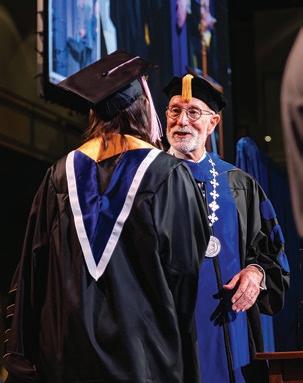
second-highest median LSAT score (151) in the school’s recorded history OCU has also enjoyed strong fundraising years, with three consecutive years each topping $10 million. Donors gave $13.19 million to OCU over the past year, including nearly half a million dollars from a record 1,211 donors on #TrueBlueOCU Giving Day in April. In these pages, you’ll see examples of ways that OCU donors are leading the way to provide scholarship support and unique opportunities for our students. You, too, help our students achieve success. Thank you for believing in them and in OCU.
If you find yourself in Oklahoma City, I hope you’ll take the time to visit campus, which teems with performing arts and athletic events, alumni get-togethers and more. We have worked to build a strong community among our students as a foundation for excelling in their fields and in life. You can expect great things from our Stars.
Sincerely,

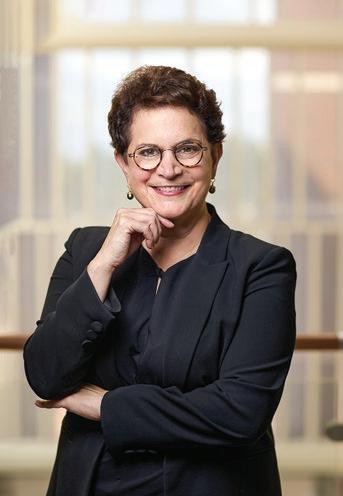
Chair, Development & Strategic Planning Committee
“Delivery of education is changing— students can start their degree any time of year, in person or online—and OCU is at the forefront of that change, led by President Evans and followed by the deans. Market leadership is crucial as colleges nationwide prepare for a drop in traditional college-age students over the next few years. That’s especially important at small, private colleges like OCU that depend on student tuition for their budgets. OCU’s position is strong. Deans have tapped into creativity and designed programs that students want. If you build good programs, donors follow. OCU and its students have even greater opportunities when deans and donors form partnerships.”
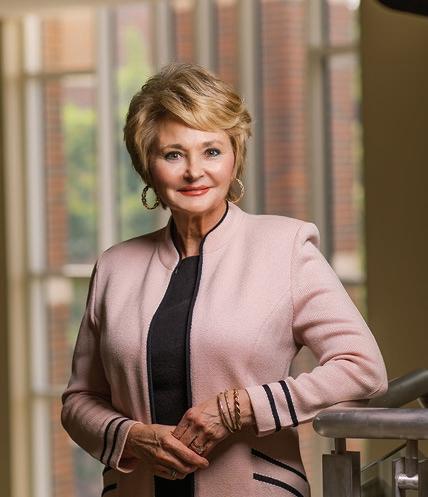
Chair, Investment Committee
“Like many private universities, Oklahoma City University has faced higher operating costs and changes in the post-pandemic environment. We are very grateful our endowment has provided the financial flexibility to meet those challenges. Our earnings and our fundraising have been strong, but we’re depending more on individual and corporate donors. We need your help! We’re asking each donor to encourage another OCU graduate or friend to give to OCU in any amount and begin a giving tradition. Thank you for your generosity, which ensures OCU’s excellence into the future.”
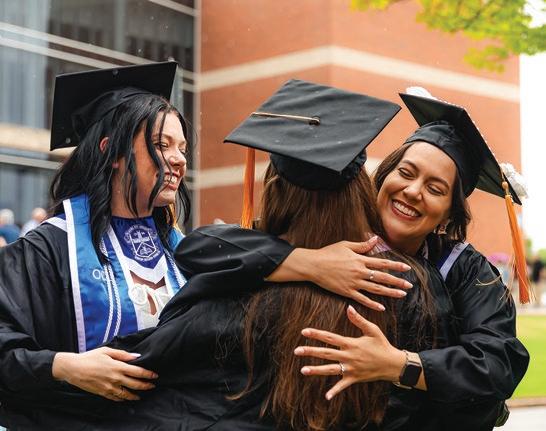

2,966
Fall 2024 enrollment, a 16% increase over 2022
92%
Of undergraduate students received institutional aid from OCU in 2023–24
$32,625
Average amount undergraduate students paid for tuition and fees in 2023–24
The market value of endowment funds, including endowments held by other entities for the benefit of OCU, was $180,349,325 as of June 30, 2024. This report highlights those funds directly managed by OCU trustees through the Oklahoma Methodist Foundation—$91.6 million in fiscal year 2024—along with an overview of the university’s finances.
After the first half of 2023 brought a regional banking crisis, the stock market rebounded strongly and was characterized by robust growth, particularly in the technology sector, against a backdrop of geopolitical uncertainties. The overall sentiment remained positive, with investors optimistic about continued economic recovery and technological advancements. The S&P 500 gained 24.6%, international developed market stocks in the MSCI EAFE Index gained 11.5%, and bonds had moderate gains with an expected federal funds rate cut occurring in September 2024. The Bloomberg Aggregate Bond Index was up 2.6% for the fiscal year.
Our generous and faithful donors continue to provide a significant margin of excellence for students and the faculty, staff and programs that support them. Your philanthropy makes a profound, positive impact and continues to help make Oklahoma City University the best educational institution possible.
Many of our donors choose to direct their gifts toward endowed funds. OCU’s endowment, including endowments held by other entities for the benefit of OCU, is made up of 687 individual funds designed to provide perpetual financial support for scholarships, faculty professorships and chairs, the various schools, library resources and other endowed programs. Of these funds, 594 are held at OCU, 71 by the Oklahoma Methodist Foundation, and 22 by the Oklahoma City Community Foundation.
* The fiscal year 2024 audit is in progress; audited financial information will be posted when complete on okcu.edu/financial-reports.
Oklahoma City University is committed to prudent, time-tested investment strategies and fiscal policies. The Board of Trustees Investment Committee is charged with overseeing its funds and measuring the returns they produce against nationally recognized standards and metrics for investment performance.
The Board of Trustees Investment Committee actively monitors the financial markets to control risk and evaluate exposure for all asset classes. The Oklahoma Methodist Foundation serves as the advisor and record keeper, and Wespath Institutional Investments serves as investment manager to the committee.
In managing the endowment, the university seeks to balance the dual objectives of enhancing the future purchasing power of endowment funds and meeting current spending needs. The endowment is invested with a long-term horizon to ensure that it will grow at a rate above inflation, while providing a stable stream of income to support the purposes for which its funds were created. Endowment growth is due not only to the generosity of thousands of alumni, friends, corporations and foundations through the years, but also to the careful stewardship provided by the Board of Trustees.
$180.3 million | FY24*
OCU Endowment
Managed by the Oklahoma Methodist Foundation • 50.77%
Oklahoma Methodist Foundation Endowment for the Benefit of OCU • 45.68%
Oklahoma City Community Foundation and Other Private Foundations for the Benefit of OCU • 3.55%
$91.6 million | FY24*
Clockwise from top of
$91.6 million | FY24*
Nursing • 1.88% Religion • 9.41%
St. Paul School of Theology • 0.11%
Student Aid • 14.49%
Theatre • 1.14%
University-Church Relations • 0.55%
Other • 6.17%
* The fiscal year 2024 audit is in progress; audited financial information will be posted when complete on okcu.edu/financial-reports.
OCU’s directly managed endowment portfolio of $91,559,464 was composed of these asset classes as of June 30, 2024. The guiding principle of OCU’s consolidated endowment program is that funds should be managed so that a gift today will fund a donor’s objective in perpetuity.
+ The spending policy for OCU’s Endowment is 5% of the average market value of the endowment for the previous 20 quarters (fiveyear rolling average). This rolling, multi-year average helps to provide more predictable spending budgets. In Fiscal Year 2024, OCU’s Board of Trustees authorized an additional 2.5% distribution. The total distribution for the year was $5,901,160.
^ Prior to 2/1/2024, the asset allocations were 35% Russell 3000, 30% MSCI EAFE, 35% BB US Aggregate. The change was made to lower fees.
The historical returns presented herein represent the actual historical returns of the OCU Endowment, which reflect the deduction of fees charged by third parties.
The information in this document was obtained from sources believed to be reliable; however, accuracy is not guaranteed. Historical returns are not indicative of future performance.
1 Lipper Median returns from the Lipper mutual fund universe for balanced funds in the asset class category. As of 7/15/24, the universe consisted of 403 peers. Source: Wilshire Associates, Lipper, and Wespath.
2 Historical returns are time-weighted. Returns greater than one year are annualized.
3 Past performance is no guarantee of future returns.
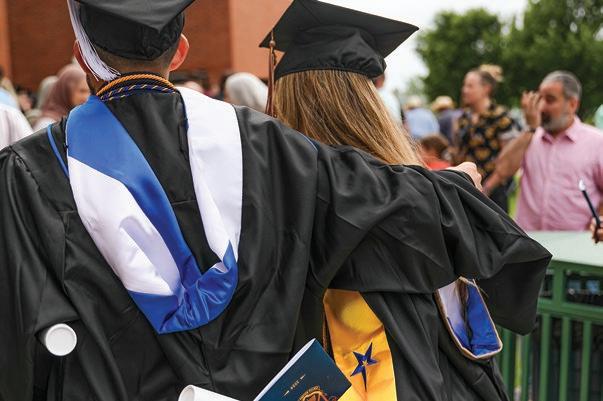
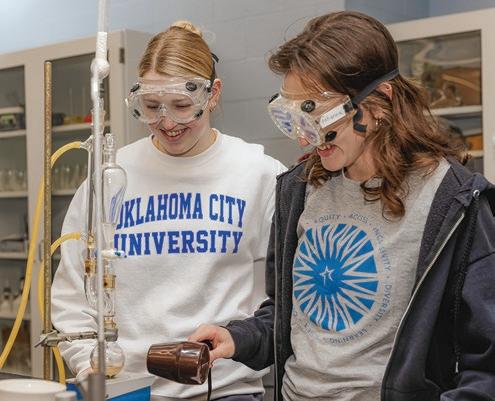

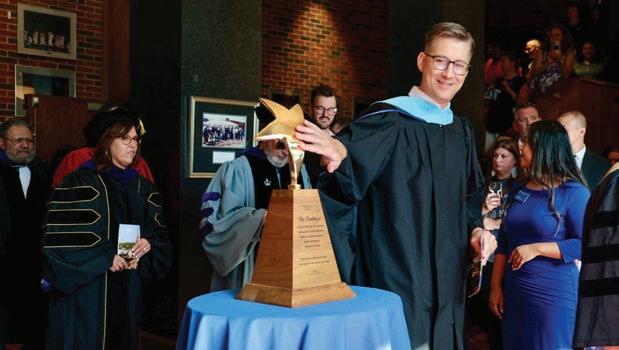
BY LISA LITTRELL
The Rev. Carl Warren Stokes graduated from Thrall High School in Texas in 1939. He received bachelor’s degrees in religion and business from Oklahoma City University in 1949, two degrees from Southern Methodist University in 1957 and 1975 and a master’s from what is now the University of Central Oklahoma in 1979. He completed the U.S. Navy General Line (Chaplain) School in Newport, Rhode Island, in 1952. Lieutenant Junior Grade Stokes served as a Navy chaplain for two years, including service in Korea. He received a National Defense Medal. Stokes was ordained an Episcopal priest in February 1959. He served as a Methodist pastor from 1944 to 1958 and as an Episcopal priest from 1959 to 1983. Churches where he served included the Cache First United Methodist Church in Cache, Oklahoma; St. Luke’s Episcopal Church
in Chickasha, Oklahoma, as curate; and St. Peter’s Episcopal Church in Coalgate, Oklahoma, as vicar. He retired in 1983. At the time of his death, Father Stokes was a member of St. Michael’s Episcopal Church in Norman, where he had been a faithful member. He was also an enrolled member of the Cherokee Nation. The endowment provided by Stokes provides a scholarship for students majoring in dance who maintain a minimum 3.0 GPA.
Donor Jordan Taylor Downs established this fund to honor Nina Belle Richardson and Richardson’s husband, Bernard Doyle Ford. Richardson graduated from Classen High School in 1945 and attended OCU, where she pursued a degree in liberal arts. Ford went to Earlsboro High School and obtained a degree in petroleum engineering in 1954. Richardson and Ford were married in 1955, and they shared a lifelong love of music, art and family. They also placed great importance on education and instilled those values in their children and grandchildren. This endowment will provide funds to assist students in good academic standing who have

demonstrated financial need to purchase required textbooks. Preference will be given to students who work on campus.
OCU Trustee John Veal and his wife, Ginger, are proponents of education and Oklahoma City University. He is an Army veteran and served in Operations Desert Shield and Desert Storm. He was a member of the Finance Corps and retired at the rank of first sergeant after a 23-year career. The Veals’ OCU journey began when John began contemplating his post-U.S. Army retirement plans. He earned two OCU degrees, an MBA in 1996 and a Master of Science in Accounting in 2018 through a Fort Sill satellite program.
John and Ginger Veal found themselves participating in various campus activities and taking an active role in supporting the university’s students. John Veal is an adjunct professor and leads the Volunteer Income Tax Assistance program with the Meinders School of Business. Ginger Veal is deeply connected to the community, serving as the volunteer manager for Elara Caring Hospice in Lawton, Oklahoma, an endeavor rooted in compassion and care.
The Veals believe education can transform lives, and they’re motivated to uplift students. “We believe in promoting opportunities for students to continue their education,” John Veal said. “By donating to OCU, we are a part of the process of helping the dreams of our students become reality.” Their endowed scholarship will recognize first-generation students enrolled at OCU and assist them with necessary educational expenses.
Dr. Richard Wansley (BA Psychology ’71) and Dr. Meredith Cummings Davison (BA Philosophy ’69) earned their undergraduate degrees at Oklahoma City University. They each came from small
towns in Oklahoma and depended on scholarships. Wansley initially attended a large state university, but he kept driving past OCU and decided to enroll. After Davison had completed her degree, she returned to campus to visit her younger brother who was attending OCU at the time and met his friend Wansley. A few years later, Wansley and Davison hit it off as graduate students and eventually married.
As time has passed, the couple’s fondness for their undergraduate alma mater has continued to grow to the point that they decided to establish the scholarship with a cash donation, as well as include it in their estate plans. “As we were getting older, we started to think about how to make a difference with what we were fortunate enough to accumulate. OCU came to the top of both of our minds,” Davison said. “We want to help others as we feel like we’ve been helped. I feel like people were put on this earth to make it better, and that’s an opportunity to do so.”
The Drs. Wansley and Davison Scholarship Fund will provide support for first-generation students from rural areas or small towns who are enrolled in the Petree College of Arts & Sciences. The scholarship will honor students who have shown or are expected to demonstrate collegiate academic achievement.
U.S. Coast Guard Captain William Webster received the Coast Guard Achievement Medal and viewed education as an important life endeavor, obtaining multiple degrees in naval engineering and electrical engineering. After completing 28 years of Coast Guard service, Webster became a professor at the University of Missouri-St. Louis. He encouraged and supported his children and grandchildren to reach their educational goals. During his time in the Coast Guard, Webster was also an intermural champion in wrestling. His experiences intrigued his granddaughter, Emily Webster, who became a women’s wrestling champion, with four undefeated national collegiate championships and an 118-0 cumulative record in her career at OCU. This endowment, created to honor Captain Webster’s constant pursuit of education and his wrestling career, will provide recognition and financial assistance for OCU students participating in the women’s wrestling program.
The late Ann Lacy gave generously to OCU, supporting causes from the Ann Lacy Stadium for softball to the Ann Lacy Admissions and Visitor Center. But most of all, she supported the Ann Lacy School of American Dance and Entertainment. Lacy designated a portion of her estate to establish an endowed position, the Jo Rowan Endowed Chair, named in honor of OCU’s founding dance chair. Read more about this gift on page 10.
BY ETHAN ZAMBRANO
The Ann Lacy School of American Dance and Entertainment at Oklahoma City University has always been a beacon of excellence, producing world-class dancers, managers and teachers. However, the past fiscal year has been particularly remarkable with a surge in philanthropic support that will leave a lasting impact on the school’s future.
One of the most significant milestones this year was the $1.2 million estate gift from Ann Lacy, a name synonymous with the school’s rich history and success. Lacy, who passed away in August 2023, always had a deep respect and admiration for Jo Rowan, the founding dance chair. The gift was not merely a donation—it was a testament to Lacy’s wish to honor Rowan’s legacy.
“Ann always wanted Jo to be recognized for her unparalleled influence on our school and students,” said Chris Lawson, Lacy’s grandson and president of The Ann Lacy Foundation. “She made it happen through her estate, ensuring Jo’s legacy lives on in the most meaningful way.”
The endowed chair, aptly named the Jo Rowan Endowed Chair, was awarded to Jessica Fay, a longtime professor and the current ballet chair who had been mentored by Rowan throughout her career. Dean Melanie Shelley expressed her pride in the tribute: “Jessica is more than deserving of this honor. It was Ann’s wish that this position be created in Jo’s name, and Jessica’s impact on our ballet students makes her the perfect recipient.”
Philanthropy also played a crucial role in enhancing the physical spaces where students train and perform.
In fall 2019, then-Dean John Bedford envisioned a state-ofthe-art studio dedicated to dance for video—a vital skill in today’s entertainment industry. This vision gained new urgency during the pandemic and never lost relevance. Shelley launched a targeted fundraising campaign for the studio in December 2023. Additionally, this year marks the 17th anniversary of the Ann Lacy School of Dance and Entertainment in the Edith Kennedy Gaylord Center. The studio floors, used an average of 10 hours a day, bear witness to the dedication of students practicing tap, jazz, ballet, theatre dance, precision line, pointe and more. With years of constant use comes inevitable wear and tear. To maintain the high standards of OCU’s learning spaces and continue offering students the best environment to grow, it was time to update and enhance studio facilities.
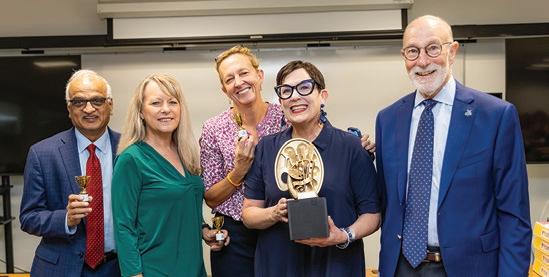
“Generosity truly is contagious,” Shelley said. “When Jeaneen Naifeh, an alumna and passionate supporter of the arts, designated a $50,000 portion of her pledge for dance studio renovations as a challenge during OCU Giving Day 2024, it sparked a wave of support that allowed us to raise an additional $26,000.” After hearing about Naifeh’s gift, an anonymous dance graduate stepped forward with a large donation to honor founding Dean Emeritus John Bedford and ensure the Dean John Bedford Video Dance Studio would become a reality. Naifeh passed away in August. The studio will enhance students’ educational experiences including choreography and dance for the digital world, allow OCU to showcase the talent within OCU’s dance and entertainment school to a broader audience and provide a professional space for dancers to record their audition reels and serve as a dance lighting lab.
The past year also saw a significant increase in donor participation in the school, with a remarkable 33% rise in the number of donors. The total amount raised skyrocketed from almost $50,000 in 2023 to nearly $1.5 million in 2024—a testament to the deep connection and commitment that alumni, friends and faculty feel toward the school.
“It’s been incredibly touching to see our alumni give back in such meaningful ways,” Shelley said. “I love connecting with them, and it’s extra special when their generosity directly impacts our students’ learning experiences. We’re using these donations to move our programs forward, ensuring that we provide the best possible education for our students.”
As the school looks to the future, the sense of excitement is palpable. Support for the Star Dance Company is just beginning. In its second year, the Star Dance Company quickly exceeded sponsorships from the previous year, with more donors supporting special projects. Michael Tavlin and Marvona Easley

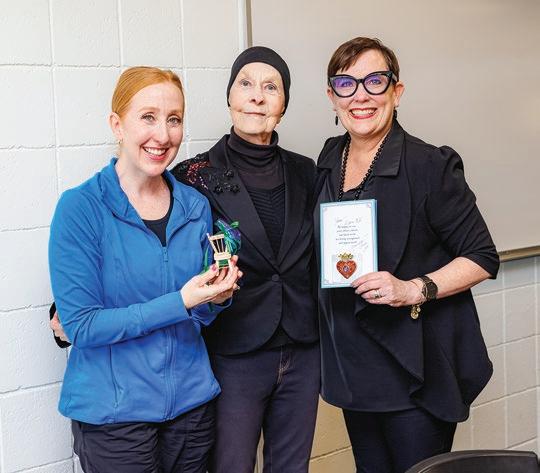
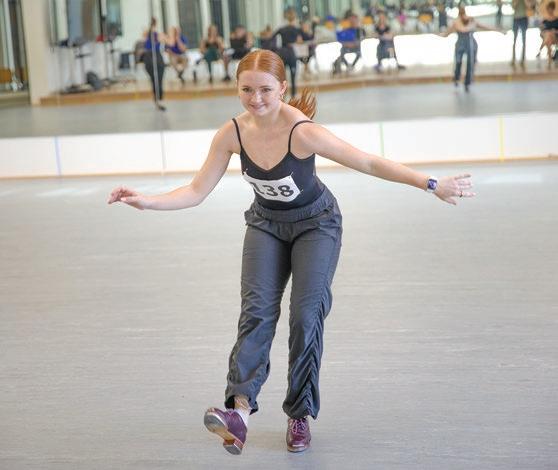
Opposite page: Dean Melanie Shelley, surrounded by fellow deans and President Kenneth Evans, received the trophy for dean with the most Giving Day donors in 2024. Above, top: A gift from Michael Tavlin and Marvona Easley Tavlin allowed the Ann Lacy School of American Dance and Entertainment to buy new finale costumes for the entire 130-person Star Dance Company for the Holiday Spectacular. Above,
Professor Jessica Fay was awarded the Jo Rowan Endowed Chair in a surprise presentation by Dean Melanie Shelley, right, and retired Dance Chair Jo Rowan, center, following a gift from Ann Lacy’s estate. Above, right: A student auditions on new studio floors funded by late alumna Jeaneen Naifeh.
Tavlin made production-related contributions, including new costumes, sewing machines and costume mannequins. Former professor Nikki Singer gave $15,000 to support the Community Dance Academy, enabling economically challenged children to attend classes provided by OCU’s teaching laboratory for dance pedagogy and dance management students.
“Giving back is one of our values,” Shelley said. “It’s rewarding
because the more we can highlight what we do, the more people get excited and want to be part of that experience. I’m proud of our faculty, staff and students. It’s easy to promote what we do because we have great people here.”
As the school grows, the generosity of its supporters will undoubtedly light the way, ensuring the school remains a leader in dance and entertainment management education for years to come.
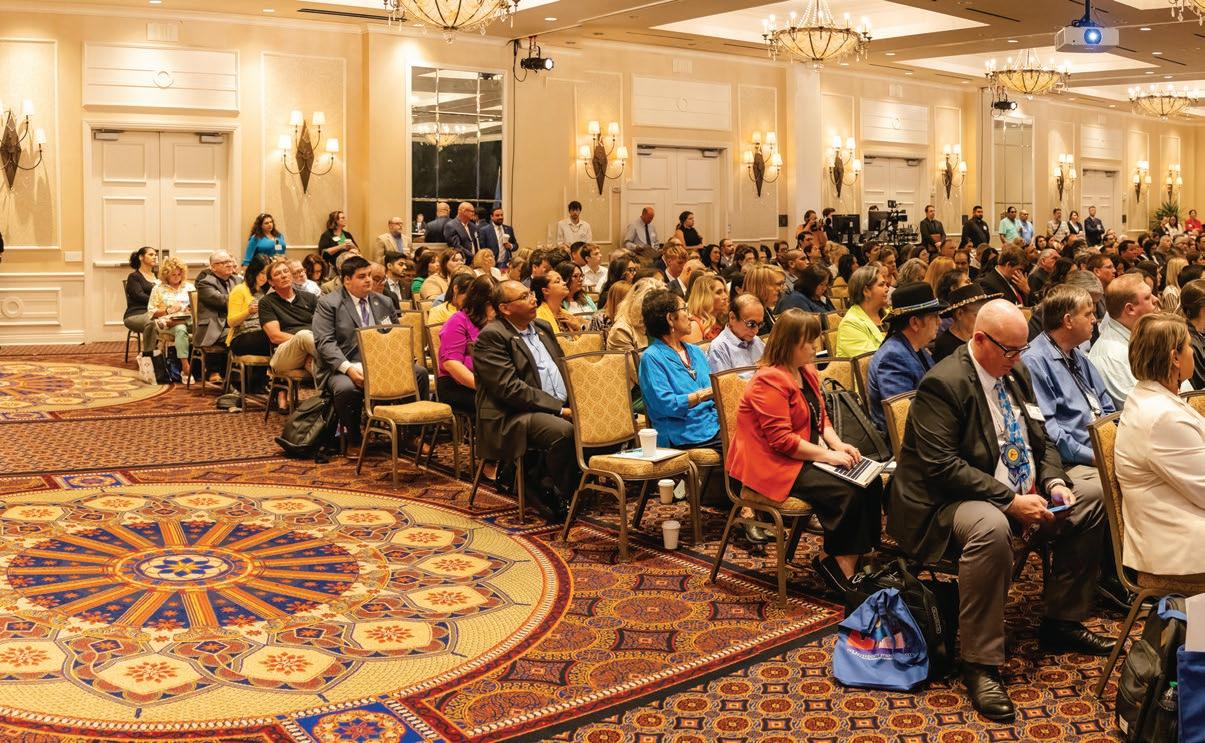
BY KATE DOWNING
Successful partnerships come in many varieties. In corporate and foundation philanthropy, some issues are bigger than any one grant. A nimble liberal arts university such as Oklahoma City University can be an ideal partner to tackle big ideas, with its array of academic departments and its network of connections.
For example, OCU has successfully pieced together partnerships to help with tribal language preservation and lead international discussions on tribal sovereignty.
President Kenneth Evans activated his relationship with Apple when he arrived at OCU several years ago, creating a pathway for OCU to assist Native American tribes in Oklahoma with language revitalization by way of teaching students how to code. Through the Apple partnership, OCU has successfully led coding workshops for public school teachers.
“Not only was Apple on board with rolling out coding training through OCU, but the tech giant showed interest in collaborating on language revitalization as well,” Evans said. “Apple was already working on this with tribes in Alaska, Europe and New Zealand and wanted to partner with Native American tribes in Oklahoma through their connection with OCU.”
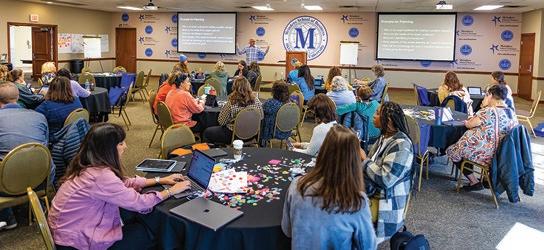
The Osage Nation, Cherokee Nation, Choctaw Nation and Chickasaw Nation are involved in working to pass on their languages to future generations with OCU’s and Apple’s assistance.
This work helped reinforce OCU’s commitment to serving Native Americans.
Then, Oklahoma Supreme Court’s Justice Yvonne Kauger approached OCU’s School of Law about taking over the Sovereignty Symposium, the nation’s leading tribal legal conference, born out of her office 36 years ago. The 2024 symposium, fully managed for the first time by OCU, saw record attendance.
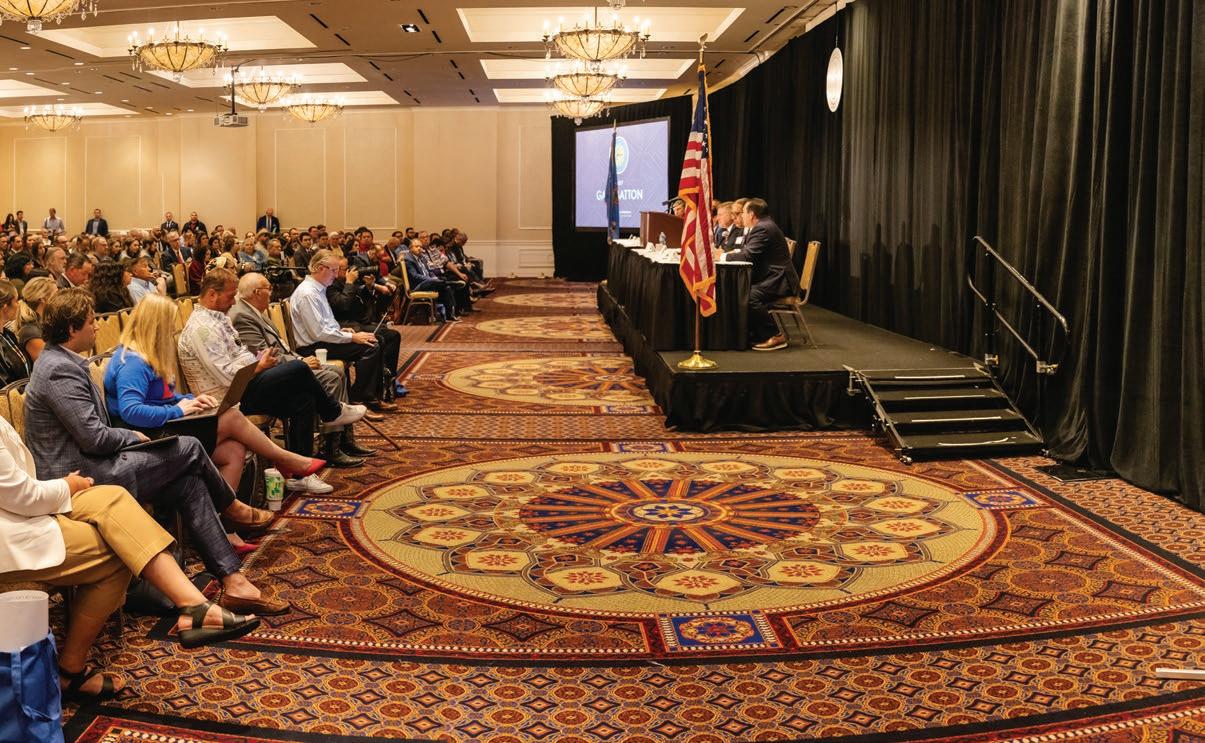
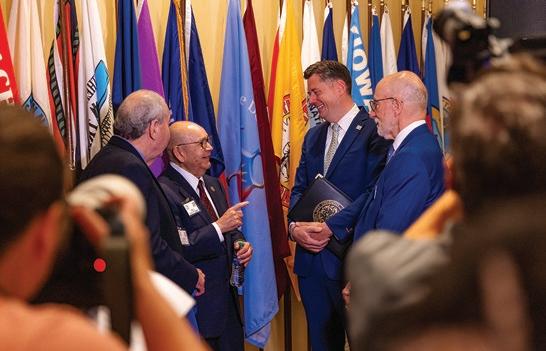
“Tribal sovereignty has never been more central to legal and policy conversations in our region,” said OCU Law Dean David Holt. “We are honored to have the opportunity to carry the Supreme Court’s legacy forward and to build upon it. Hosting Sovereignty Symposium will give OCU Law and OCU a platform to be at the center of this critical issue.”
Evans anticipates significant growth for the symposium in the coming years.
“This work is mission-centric for OCU,” he said. “We hold space in our hearts for what we do for others—in this case, helping
the press conference announcing the new Tribal Sovereignty Institute at this year’s Sovereignty Symposium.
people maintain their sovereignty. OCU can make a difference in this space.”
This summer, the law school announced the new OCU Tribal Sovereignty Institute. A national search is underway to name an executive director, with support from Oklahoma tribes.
“Apple has been an amazing partner, which elevated our university’s profile to become involved in the Sovereignty Symposium,” Evans said. “This event spurred our relationships with the tribal community and then led to the creation of the Tribal Sovereignty Institute. Our partnership was founded from a simple vision of collaboration.”
The ideas are endless for what can be done when thinking outside the box with OCU. Think about what you or your organization could do, as a supporter of Oklahoma City University, sharing your passion. Your insight as someone who knows OCU well is welcome, and we encourage you to let us know your thoughts and dreams for advancing our university.

BY APRIL MARCISZEWSKI
Jerry Vannatta, a medical doctor, sat across from an 87-year-old patient. They’d been discussing health details, but they weren’t connecting. Decades later, Vannatta would look back on this moment as leading him to pioneer a new field in his longtime medical school.
“You know, I didn’t get to know you really well, so why don’t you tell me about your life?” he prompted.
She could have shared anything.
“When I grew up in East Texas, my daddy was a sharecropper,” she said. Her father
wouldn’t let her choose her husband and made her marry a fellow sharecropper. “He wasn’t very good at making a living, but he was very good at making babies. We had 17 of them.”
She told Vannatta about her time as a housekeeper, and how the house’s owner would sometimes give her a pail of milk and a dozen eggs to carry back home on foot.
“Have you ever carried a pail of milk?” she asked Vannatta. He could relate—he carried water to the chickens growing up in Keyes in the Oklahoma Panhandle, and it wasn’t easy.
As his patient shared her story, Vannatta recalled a similar image from literature. He had begun reading Pulitzer Prize-winners the previous year. Although the woman’s story was unique, Vannatta felt like he understood his patient better because of the humanities.
“What we do in medical school is about people, not science,” Vannatta realized. “You don’t get that in organic chemistry; you don’t get that in physics. I knew immediately that I needed to share that understanding with others.”
Even in college, Vannatta knew he wanted to be good enough at his profession to make a mark. This was it, and it started at Oklahoma City University.
“As a junior, I was called into the office of the vice president of education, and he said to me, ‘Jerry, I’ve been studying your transcript, and I don’t see very much literature or philosophy.’” Vannatta, a physics major, responded: “Well, I’m interested in science and math. I have taken all of the requirements.” The vice president told Vannatta he’d be better educated with a more robust humanities background. “I didn’t want to do it, but I knew he was right,” Vannatta said.
Vannatta grew up Methodist and drove six hours from home to visit OCU both his junior and senior years of high school. He described OCU’s physics program as the best in the state. OCU’s “Great Plan” to elevate academics was underway, and Vannatta remembered smart students flocking to the university. “I thought the faculty were tremendous.”
“OCU prepared me well because of its concentration on liberal arts.”
He planned to attend graduate school for biophysics. A friend asked about the lab work involved in the graduate program, then told Vannatta: “That is baloney. You love people, and people love you. You ought to become a physician.”
“I went home that night, woke my fiancé up, and told her, ‘I’m going to medical school!’” he said.
It was two weeks from graduation, he hadn’t taken the entrance exam, and he didn’t have all of the prerequisite classes. So he looked for a teaching job, which was hard to find because he lacked those credentials, too. He and his wife, Marianne—they married the day after graduation in 1970—ended up in Lubbock, Texas, where he taught algebra and chemistry and they had their first baby.
“Algebra, I could teach in my sleep,” Vannatta said. “Chemistry, I was staying a week ahead of the students. General chemistry was not second nature to me. I had to work every night to figure out how to explain it to the kids, and I fell in love with the process.”
He pushed himself to find teaching methods that would connect with different students so the concepts would click for everyone in class.
Rising through the academic ranks, Vannatta went on to become the executive dean of the University of Oklahoma’s College of Medicine and was nominated for various teaching awards more than two dozen times, winning many. One award even paid for him and Marianne to travel with their two sons, Jeremy and Seth, to England for soccer with the late OCU soccer coach Brian Harvey, who also coached club soccer for high schoolers.
At OU, after his experience with the patient from East Texas, Vannatta set out to teach Literature in Medicine to undergraduate students and was rebuffed by one colleague before finding a teaching partner, English professor Ronald Schleifer. They taught the class together for 20 years and published two books on the subject.
“I created a new field in the medical school—the humanities,” Vannatta said.
After he retired, Vannatta co-founded OCU’s Physician Assistant program and served as its medical director with the understanding it would have a humanities thread. In January, OCU’s health professions programs partnered with the School of Theatre to bring in a playwright and host a reading of “W;t,” in
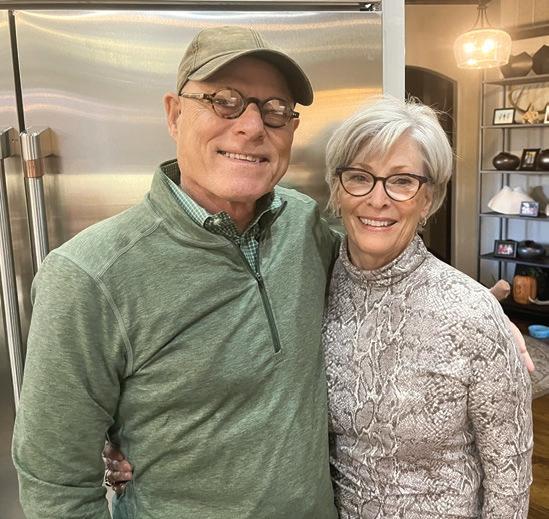
Above and left: Dr. Jerry Vannatta and his wife, Melinda Lyon, Ph.D., who make a point of seeking out arts performances in New York featuring OCU alumni.
which an English professor undergoes cancer treatment—and poor treatment by medical professionals more interested in her research value than her humanity.
“It was one of my favorite things we’ve ever done,” Vannatta said. “It demonstrates what the humanities and arts have to say to medicine.”
Vannatta has served on OCU’s Board of Trustees since 1996 and leads the academic affairs committee.
“I feel like OCU has been there for me. Even though I didn’t participate in all of the humanities they offered, they taught me that it was really, really important,” he said. “Therefore, I feel really, really obligated to give back.”
He and his first wife, Marianne, who died after a five-month battle with stomach cancer in 2009, created an estate plan and set up a charitable remainder unitrust in 1993 to benefit the educational institutions important to their family, including OCU. Marianne, a CPA, made the arrangement, and “it’s absolutely brilliant.” The couple had already established two OCU scholarships—one in nursing to honor Marianne’s sorority sister who died—so they planned for their trust to add to those funds— the Jerry and Marianne Vannatta Endowed Scholarship Fund and the Marianne Vannatta Race with the Stars Endowed Scholarship Fund—upon their deaths. Both of them received OCU scholarships, which helped enable them to attend OCU.
“OCU comes full circle,” Vannatta reflected. “It prepared me well to go to medical school. More important, it prepared me because of its concentration on liberal arts.”
BY RAYELEE M c FEE AND BRYAN BAXTER
Servant-leadership and philanthropy permeate Ashlie Wilhelm’s personal and professional life. When she attended Oklahoma City University for her bachelor’s and master’s degrees, she saw that modeled every day in the educational community.
“OCU didn’t just prepare me for my career—it prepared me for life,” she said. “The professors I had were so involved on a day-to-day basis in my well-being, my educational growth and my personal growth.”
Since she enrolled as an undergraduate in 1998, Wilhelm’s connection to OCU has remained strong. She and her family enjoy attending campus events such as homecoming and holiday performances, and she enjoys the friendly competition of the annual #TrueBlueOCU Giving Day. “This year, we surpassed the numbers of every year prior, and that’s something to be proud of,” she said. “I also think it’s something to look forward to, and it’s fun.”
Wilhelm continues to support OCU study abroad scholarships, OCU’s Modern Language Excellence Fund and other Arts & Sciences causes in recognition of their impact on her life.
Reflecting on her decision to attend OCU, she noted, “I knew I wanted to make something of myself.” She pursued a double major in Asian studies and political science, minored in Mandarin and was especially active in the foreign language honors society, Alpha Mu Gamma, with French professor Jacques Buttin. During grad school, she and Buttin brainstormed how to expand the honor society. Wilhelm had an idea to host cultural dinners for the OCU community at different local restaurants every month. On her lunch break from her job in OCU’s Meinders School of

Business, she made flyers for the dinners and posted them all over campus. She researched a different country each month and created a one-page synopsis of its culture, population and more. She invited anyone who had traveled to the country to share photos and stories.
“The first year, I would have five or six students show up, plus Professor Buttin,” she said. “Over time, other professors started trickling in, and then my co-workers at the business school would come and bring their spouses. Then eventually, we would have literally 30 to 40 people at a time.”
“I realized your academic advisers and professors wanted to be involved in the things you were interested in and help you grow. That meant in class, that meant out of class, down time, fun time—any way we could do things as an OCU community.”
Balancing everything wasn’t easy, but she credits the supportive faculty for making it work. “Dr. (Richard) Johnson worked with me every day to combine my double major courses, all while I worked full time. His flexibility, patience and guidance changed my life,” she said.
A pivotal moment in Wilhelm’s life was her study abroad experience in Tianjin, China. “I was lucky to be a student in China during my undergrad, and that was a life-changing experience for me,” she said. “Had I not received that $300 partial scholarship, I wouldn’t have been able to buy that plane ticket.”
This experience was a significant catalyst for her future endeavors. Wilhelm went on to complete her Master of Liberal Arts in Management & Leadership in 2004 and eventually began her career at Wilspec Technologies Inc., where she met her husband, Larry, the company’s founder, owner and CEO.

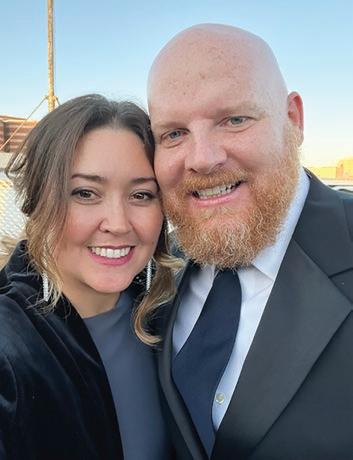
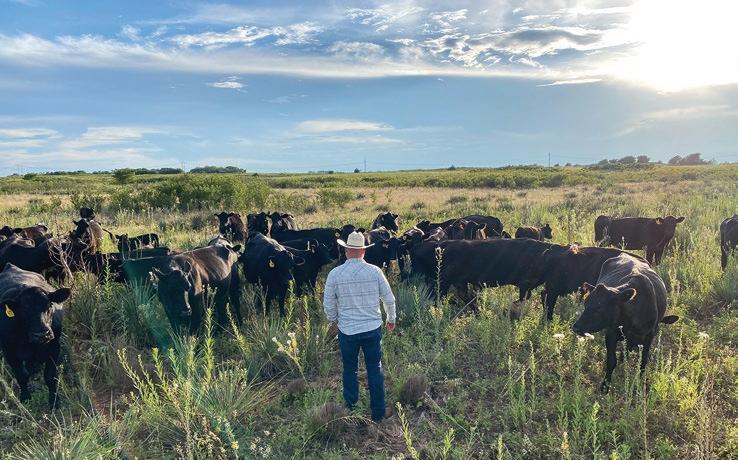
“I realized your academic advisers and professors wanted to be involved in the things you were interested in and help you grow. That meant in class, that meant out of class, down time, fun time.”
—Ashlie Wilhelm
Wilhelm serves as the global human resources manager for Wilspec and has dedicated much of her career to enhancing team building, human resources and crosscultural communications for business professionals. She has also taught Mandarin at Oklahoma City Community College and the Greater Oklahoma City Chamber of Commerce and served a myriad of organizations and causes near and far.
The couple have seven children, ranging from age 10 to 26, including two children from China they adopted as middle schoolers.
Wilhelm got involved in charitable work through the March of Dimes after losing a twin baby in 2011. Later, the couple’s youngest daughter was diagnosed with Type 1 diabetes and almost didn’t make it, prompting Wilhelm to support the nonprofit Breakthrough T1D.
When the 2013 Moore, Oklahoma, tornado hit, her charitable involvement plucked at her heartstrings. The Wilspec headquarters had been damaged, but all of the employees were safe. However, many employees didn’t have storm shelters, so the Wilhelms offered to cover
half of the cost for any who wanted to have one installed.
“We decided we were going to talk to the employees about raising some money and doing some volunteer hours after that storm season had ended,” Wilhelm said. Together, they raised $20,000 for the American Red Cross.
When the Wilhelms and their 26 employees realized what they were collectively capable of, Ashlie Wilhelm asked the employees if they’d like to start giving to causes annually. Every year, each employee could designate a charity during the Season of Giving, starting in November. The employees loved the idea. Now, the company fully matches donations, besides donating an additional $1,000 to each cause, and Wilspec also offers volunteer hours and hosts guest speakers related to the causes.
“It’s turned into an amazing program in its 10th year as a way to support our employees but also support the world,” Wilhelm said. “The list goes on and on with the ways you can support people, whether it be cancer, autism spectrum or substance abuse, homelessness or feeding kids. Things like that are absolutely critical to helping people have a better society.”
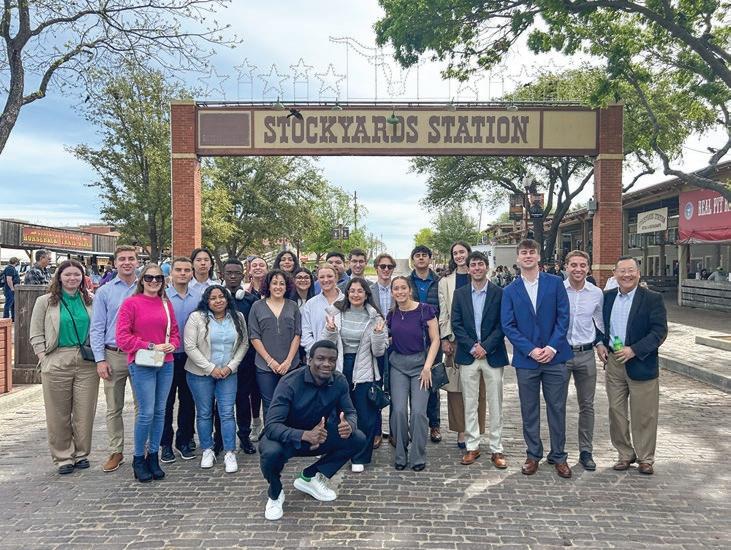
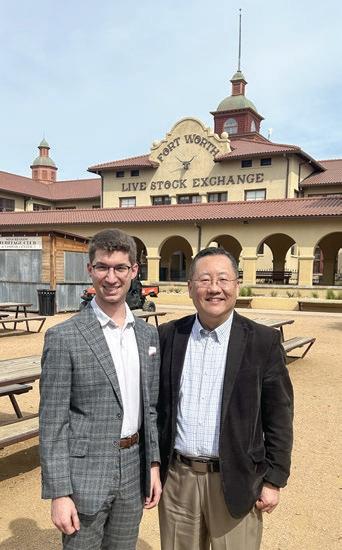
BY KRISTEN MERRITT
Oklahoma City University’s commitment to implementing innovative learning experiences for students has thrived over the years. Because of donors and alumni who support this type of learning, students on campus are getting opportunities that help them flourish in their personal and professional lives.
This past spring, the Meinders School of Business took a group of students to Dallas-Fort Worth, where they ventured out of the familiar confines of lecture halls and textbooks and were immersed in the dynamic world of business. They toured corporations, including Thompson Reuters and Wells Fargo Investment Management. They gained a firsthand look at the inner workings of the industries and had an opportunity to interact with seasoned professionals.
“Through the Meinders School of Business trip to Dallas, I was able to network with many individuals in the fields of banking, personal finance, technology and advancement,” said Anthony Giordano, a junior majoring in finance and economics. “This great opportunity and wonderful experience allowed me to grow my network and enhance my professional skills in a multitude of ways.”
On the second day of the trip, students witnessed the hustle and bustle of the Fort Worth Stockyards—with some seeing cattle up close for the first time. They also toured the Bureau of
Engraving and Printing, which produces more than half of the nation’s paper currency.
“Trips like this bridge students’ classroom learning with real-world experiences,” said James Burwell Chair in Finance and professor Dr. James Ma, who led the travel group. “It gives them a feel for how the real world works. You can see how abstract textbook concepts suddenly make sense and come to life for students.”
OCU Trustee and donor Jenee Naifeh Lister had two goals in contributing to experiential learning for business students.
“It gave these companies a chance to meet our exceptional students, and it showed our students career opportunities they might not have imagined beyond just their degree,” Lister said. “I wish I had something like that when I was a student!”
The trip speaks to the power of philanthropy to enrich education, positively impact students and shape the next generation of the workforce.
Because of donors’ generosity, Meinders School of Business students will have the opportunity to travel for the next three years on an experiential learning trip to different areas across the country, which could include New York City, San Francisco, Chicago and more.
Upper left: Business students traveled to Dallas-Fort Worth this year to visit and learn about a variety of corporations and career opportunities. Upper right: Student Anthony Giordano with professor James Ma.
BY RAYELEE M c FEE AND APRIL MARCISZEWSKI
If not for Oklahoma City University, Alyssa Payne may not have pursued her dreams.
In high school, she studied animation but enrolled as a nursing major at OCU. It wasn’t until her sophomore year that OCU’s game design and animation department reached out to her directly, having heard she was interested.
“I think because OCU is such a small campus, I was able to have that opportunity to connect with that department,” she said. “I’m so thankful.”
Payne graduated in May with a bachelor’s in game design and animation, setting her up to pursue her dream of becoming a medical illustrator and animator, with the possibility of applying to a physician assistant program, “hopefully at OCU.” She took a number of biology classes during her undergraduate degree and is wrapping up her pre-PA classes at OCU this fall.
Payne has dealt with medical issues throughout her life, and she centered her senior capstone project—a fetal pig dissection model—on helping others.
“I hope it will become a valuable resource for biology majors on campus,” she said. “I realized there is so much power between art and science that can be used for good. I think that’s something I wouldn’t have realized if I wouldn’t have come to this school.”
When it came to picking a college, Payne was on the lookout for a place where she felt she truly belonged. “I wanted to go somewhere where I fit in and that was full of life,” she said. Her campus tour at OCU was the deciding factor. She was drawn to the small, close-knit community and the genuine connections she felt.
Growing up, Payne had a speech impediment. “Because of that, I often faced a lot of bullying and isolation, especially around

lunchtime. I often ate alone because of that. When I overcame my speech impediment, I decided that I wanted to figure out a way to overcome this challenge in schools.” She discovered We Dine Together and started the first Oklahoma club at her high school, followed by the group’s first collegiate club at OCU.
“I think lunch is a great time to bond with people that you would have never expected to bond with,” she said. “Being able to make those vulnerable connections in a safe space like We Dine Together is essential to not only OCU’s campus but to all college campuses.”
Payne had always dreamed of becoming a voice-over artist, and her sophomore year, she spotted a flyer for auditions. Now her work for the Oklahoma Library for the Blind and Physically Handicapped and the National Library Service at the Library of Congress enhances accessibility to books and literature. She hopes her work encourages others to strive, dream and not let disabilities or perceptions of themselves hold them back.
At OCU, Payne has treasured her experiences with Gamma Phi Beta sorority and the Miss Oklahoma pageant. In June, she reached the Top 15 in Miss Oklahoma and was voted Miss Congeniality. She appreciated the opportunity to pursue her interests because of her scholarships.
She spoke directly to donors in saying: “Because of the scholarships I’ve received, I’m able to graduate debt-free. Thank you. It is the most incredible gift you could have possibly given us. Because of your donations, we’re able to pursue an education and make a difference in our communities.”
Her hope is that future students come to OCU and find the same opportunities. “My time at OCU shaped me,” Payne said. “I’m graduating with a wealth of knowledge and lifelong friends. I think back on these last four years and feel incredibly blessed to be part of this community.”
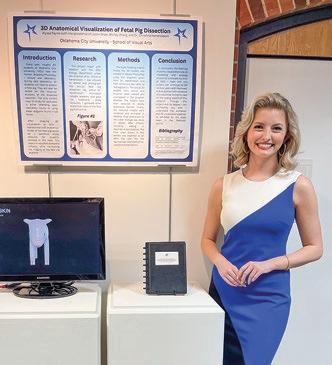
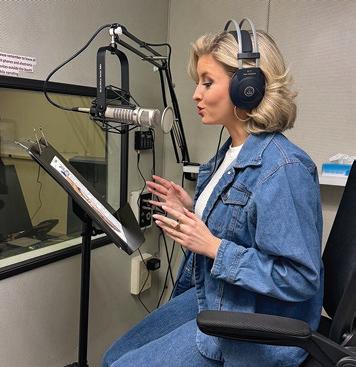


Oklahoma City University’s loyal donors rallied for a fun day of competition in April, attracting 1,210 donors who gave $461,236 in one day, a 46.5% increase over 2023. Topping last year’s 1,064 donors was no easy feat, but because of your generosity, we did so with a flourish. Five years in, the number of #TrueBlueOCU Giving Day donors has grown by 271%, and the amount raised has grown 156%. Your support makes a difference every day in students’ lives. Thank you for believing in them and making a top-notch education accessible to promising students!
Clockwise from top of graph:
Alumni and Alumni Chapters
1,210
Donors supported Giving Day, 150 more than in 2023
$461,256 Raised on Giving Day 2024, 46.5% more than in 2023 32 Donors gave $6,130 to the Resource Pantry of Hope to provide OCU community members in need with daily essentials